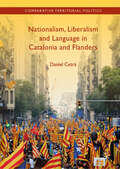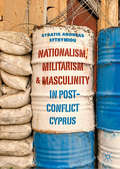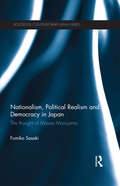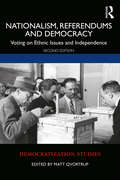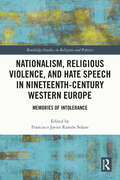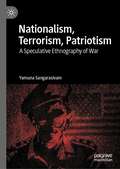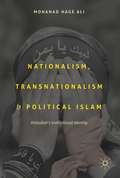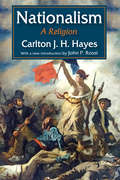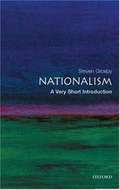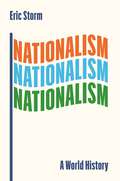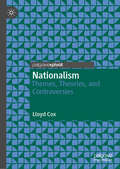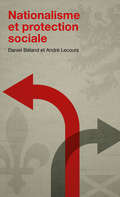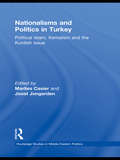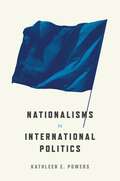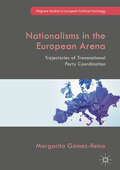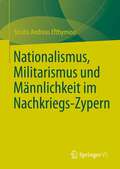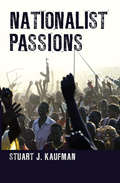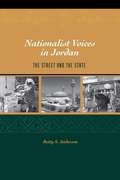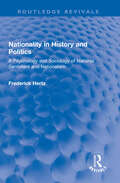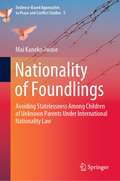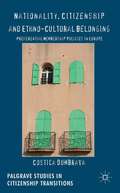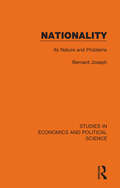- Table View
- List View
Nationalism, Liberalism and Language in Catalonia and Flanders (Comparative Territorial Politics)
by Daniel CetràIs liberalism really compatible with nationalism? Are there limits to linguistic nation-building policies? What arguments justify the imposition of national languages? This book addresses these questions by examining the linguistic disputes in Catalonia and Flanders, two major cases of sub-state nationalism. The book connects two strands of arguments: the political arguments around contested linguistic policies, drawing on a rich set of primary and secondary sources, and the theoretical arguments around liberalism and nationalism. The study also compares the historical trajectory and political dynamics of Catalan and Flemish nationalism. It shows that the relationship between language and nationhood is politically constructed through state nation-building and minority activism. The findings highlight the relevance and pervasiveness of nationalism in contemporary social and political life. This book will appeal to scholars and upper-level students interested in nationalism, contemporary political theory, the politics of language, and comparative territorial politics.
Nationalism, Militarism and Masculinity in Post-Conflict Cyprus
by Stratis Andreas EfthymiouThis book uses empirical research to introduce the relationship between nationalism, militarism and masculinity. The co-constitution between these three factors is susceptible to change and hinders reconciliation, according to the author. Drawing on the case of Cyprus, a country in conflict with Turkey, Efthymiou reveals how nationalism, militarism and masculinity were constructed after the war, and re-adapted following the opening of internal borders and European Union accession.Nationalism, Militarism and Masculinity in Post-Conflict Cyprus draws on rich field-research, with soldiers and officers in army barracks, politicians such as former President of Republic of Cyprus Glafkos Clerides, leaders of radical far-right movements and the Greek Cypriot public. The book offers invaluable insight into the application of nationalism, militarism and masculinity in governmental policy including by the Cyprus Defence Ministry, and will be of interest to students and scholars in sociology, gender studies, peace studies, security studies, politics and international relations, as well as governments and NGOs.
Nationalism, Myth, and the State in Russia and Serbia: Antecedents of the Dissolution of the Soviet Union and Yugoslavia
by Veljko VujačićThis book examines the role of Russian and Serbian nationalism in different modes of dissolution of the Soviet Union and Yugoslavia in 1991. Why did Russia's elites agree to the dissolution of the Soviet Union along the borders of Soviet republics, leaving twenty-five million Russians outside of Russia? Conversely, why did Serbia's elite succeed in mobilizing Serbs in Croatia and Bosnia for the nationalist cause? Combining a Weberian emphasis on interpretive understanding and counterfactual analysis with theories of nationalism, Veljko Vujačić highlights the role of historical legacies, national myths, collective memories, and literary narratives in shaping diametrically opposed attitudes toward the state in Russia and Serbia. The emphasis on the unintended consequences of communist nationality policy highlights how these attitudes interacted with institutional factors, favoring different outcomes in 1991. The book's postscript examines how this explanation holds up in the light of Russia's annexation of Crimea.
Nationalism, Political Realism and Democracy in Japan: The thought of Masao Maruyama (Routledge Contemporary Japan Series)
by Fumiko SasakiMasao Maruyama was the most influential and respected political thinker in post-WWII Japan. He believed that the collective mentality, inherent in the traditional Japanese way of thinking, was a key reason for the defeat in WWII and was convinced that such thought needed to be modernized. In this book Fumiko Sasaki argues that the cause of the prolonged political, economic and social decline in Japan since the early 1990s can be explained by the same characteristics Maruyama identified after 1945. Using Maruyama’s thought Sasaki explores how the Japanese people see their role in their nation, the democracy imposed by the US, and the relationship between power and international relations. Further, Sasaki also considers what the essence of national security is and how much it has been forgotten in current Japanese political thought. The book solves the puzzle of how Maruyama, a teacher of political realism who emphasized the importance of power, could insist on the policy of unarmed neutrality for Japan's national security, and in doing so, illuminates how traditional Japanese thought has impacted development in Japan. Despite his status within Japan, there are few English language books available on Maruyama and his thought on national security. This book therefore will be an essential resource for students and scholars of Japanese Politics and Political Thought.
Nationalism, Referendums and Democracy: Voting on Ethnic Issues and Independence (Democratization Studies)
by Matt QvortrupThis revised and expanded edition analyses the factors conducive to holding independence and secession referendums, to winning these votes and to their status in domestic and international law. Taking into account the votes in Catalonia and Scotland, the book shows that votes on secession and independence are not a passing phenomenon but an important part of international politics. The book includes an overview of the history of referendums on independence and a summary of the legal issues involved in doing so, as well as a chapter on referendums in unrecognised states and case study chapters exploring referendums in Kosovo, Cyprus, Kurdistan and Somaliland amongst others. By considering the ethical arguments for secession and recognition, the legal norms governing the process, and the positive and political science theory of when would-be states succeed in becoming recognized by the international community, it shows the role of referendums in the process of establishing new states, and, as a corollary, their role (if any) winning international recognition for these states. This book will be of interest to all scholars and students of political science, law and even philosophy.
Nationalism, Religious Violence, and Hate Speech in Nineteenth-Century Western Europe: Memories of Intolerance (Routledge Studies in Religion and Politics)
by Francisco Javier Ramón SolansNationalism, Religious Violence, and Hate Speech in Nineteenth-Century Western Europe critically analyses the role played by different memories of past religious violence in public debates in nineteenth-century Europe.Looking back, European societies often did not seek to overcome their differences and create a framework of peaceful coexistence among various religions and denominations, but rather, more frequently, to fuel intra- and inter-religious hatred. Moreover, various violent pasts were mobilised to define what and who was intolerant, in order to mark the "other" as intolerant and therefore incompatible with societal values. To examine conflicting memories of violence and hatred, this book focuses on commemorations, statues, publications, and public polemics surrounding past religious violence. Three elements serve as a framework to explain the conflictive nature of these memories of intolerance: the age of commemorations, the culture wars, and the second confessional age. The authors explore cases in France, Germany, Italy, Spain, Switzerland, the United Kingdom, and the Low Countries, covering Catholicism, Protestantism, Anglicanism, Islam, and Judaism. The book focuses on iconic victims such as Giordano Bruno and Michael Servetus, collective massacres, and discourses surrounding religious hatred in events such as the Crusades. The cases of religious violence remembered in the nineteenth century span the Middle Ages and the intense period of religious violence known as the confessional age.This book will appeal to students and scholars of politics, religious tolerance and freedom, hate speech, nationalism, religious history, and European history.
Nationalism, Terrorism, Patriotism: A Speculative Ethnography of War
by Yamuna SangarasivamThis book examines the intersecting forces of nationalism, terrorism, and patriotism that normalize an acceptance of the global war on terror as essential to maintaining freedom and democracy as defined by white nation-states. Readers are introduced to speculative ethnography: an experimental methodology that bends time and space through the practice of avant-garde poetics. This study conceptualizes terrorism as a place of colonial encounters between soldiers, insurgents, civilians, and leaders of nation-states. The tactics of suicide bombings employed by the Tamil nationalist movement, the Liberation Tigers of Tamil Eelam, are juxtaposed with drone strikes in asymmetric warfare where violence becomes a means of dialogue. Each chapter weaves seemingly disparate narratives from multiple experiences and sites of war, inviting readers to witness the condition of getting lost in that willful attachment to killing and being killed in service of patriotic pride and national belonging.
Nationalism, Transnationalism, and Political Islam
by Mohanad Hage AliThis book sheds light on how Hizbullah has transformed religious rituals and supernatural narratives in order to mobilize the Shi'a community. The author examines how Hizbullah has altered its institutional structure and reconstructed Lebanese Shi'a history in a manner similar to that of nationalist movements. Through fieldwork and research, the project finds that Hizbullah has centralized around the concept of Wilayat al-Fagih (Gaurdianship of the Islamic Jurists): in essence, the absolute authority of Iran's Supreme Leader over the Shi'a "nation. "
Nationalism: A Religion
by Frans A.M. von GeusauThis classic volume tells the story of nationalism, the fusion of patriotism with ethnic consciousness. It documents the emergence of nationalism in the modern world and the way that nationalism has become a substitute for religion over the past two centuries. Nationalism, for Hayes, draws its power from cultural and social factors, primarily language. Second to language are historical forces that stem from an accumulation of a people's remembered or imagined experiences.Hayes bases his observations on historic European examples. He sees nationalism as a religion, reacting against historic Christianity and the values of the Western tradition. This combination of powerful forces stresses neither charity nor the brotherhood of man. Historically it has rationalized selfishness, intolerance, and violence. The growth of nationalism, Hayes observed, brings not peace but war.As a testament to its timeless insight, Nationalism remains an informative guide despite the failure of globalization, the Internet, and international communications and connectivity to move us beyond the bonds of nationalism. Hayes's linking of the potent forces of nationalism and religion still rings true: the insurgency in Ukraine, the unrest in the Middle East, and tribal conflicts in Africa are all undergirded by nationalist sentiments.
Nationalism: A Very Short Introduction
by Steven Elliott Grosby"Understanding nationalism is central to understanding many of the social conflicts and political disputes that dominate the headlines today. In this compelling Very Short Introduction, Steven Grosby uses examples throughout history, from ancient Israel to the present-day Balkans, to discuss how nations arise from a sense of kinship, territory, history, and shared religion." "Highlighting the social, philosophical, and anthropological perspectives, he asks why nations exist, when they first appeared, and what this divisiveness can tell us about our nature as human beings."--BOOK JACKET.
Nationalism: A World History
by Eric StormA global perspective on the nature and evolution of nationalism, from the early modern era to the presentThe current rise of nationalism across the globe is a reminder that we are not, after all, living in a borderless world of virtual connectivity. In Nationalism, historian Eric Storm sheds light on contemporary nationalist movements by exploring the global evolution of nationalism, beginning with the rise of the nation-state in the eighteenth century through the revival of nationalist ideas in the present day. Storm traces the emergence of the unitary nation-state—which brought citizenship rights to some while excluding a multitude of &“others&”—and the pervasive spread of nationalist ideas through politics and culture.Storm shows how nationalism influences the arts and humanities, mapping its dissemination through newspapers, television, and social media. Sports and tourism, too, have helped fashion a world of discrete nations, each with its own character, heroes, and highlights. Nationalism saturates the physical environment, not only in the form of national museums and patriotic statues but also in efforts to preserve cultural heritage, create national parks, invent ethnic dishes and beverages, promote traditional building practices, and cultivate native plants. Nationalism has even been used for selling cars, furniture, and fashion.By tracing these tendencies across countries, Storm shows that nationalism&’s watershed moments were global. He argues that the rise of new nation-states was largely determined by shifts in the international context, that the relationships between nation-states and their citizens largely developed according to global patterns, and that worldwide intellectual trends influenced the nationalization of both culture and environment. Over the centuries, nationalism has transformed both geopolitics and the everyday life of ordinary people.
Nationalism: Themes, Theories, and Controversies
by Lloyd CoxThis book provides a concise, critical analysis of the key themes, theories, and controversies in nationalism studies. It offers an historically informed and sophisticated overview of classical and contemporary approaches to nationalism, as well as setting out an agenda for future research on nationalism and the emotions. In so doing, the book illuminates nationalism’s contemporary power and resilience, as manifested in the growth of far-right nationalist populism in Europe, the white ethno-nationalism of Trump in the United States, the resurgence of great power nationalism and rivalry in Asia, and the resilience of national secessionist movements in diverse parts of the planet. The widespread nationalistic responses to the coronavirus pandemic provide further confirmation of the continuing power of nationalism. All of these developments are discussed in the book, which will be an invaluable resource for nationalism scholars and students in Sociology, Politics and History.
Nationalisme et protection sociale
by André Lecours Daniel BélandLes études sur le nationalisme et les politiques sociales se sont multipliées au cours des dernières années, mais peu d’entre elles ont abordé les interactions entre ces deux phénomènes. Alors que les chercheurs intéressés par la citoyenneté sociale font parfois référence à ces interactions, ils se penchent rarement sur la notion de nationalisme. Pour leur part, les spécialistes du nationalisme traitent rarement de protection sociale, préférant approfondir les questions de langue, de culture, d’ethnicité et de religion. Ainsi, ce livre explore, dans une perspective historique et comparative, la nature des liens entre nationalisme et protection sociale. Au plan théorique, l’analyse jette un éclairage neuf sur une question plus générale : la relation entre la formation de l’identité, la territorialité et la protection sociale. Bien que ce livre fasse référence à plusieurs pays, il scrute particulièrement les cas du Canada (Québec), du Royaume-Uni (Écosse) et de la Belgique (Flandre) – des États multiculturels où se trouvent d’importants mouvements nationalistes. L’ouvrage examine également les politiques sociales de ces pays en regard de celles d’autres États plus monolithiques comme les États-Unis et l’Allemagne, afin d’élargir la perspective comparative entre nationalisme et protection sociale.
Nationalisms and Politics in Turkey: Political Islam, Kemalism and the Kurdish Issue (Routledge Studies in Middle Eastern Politics)
by Marlies CasierThis book examines some of the most pressing issues facing the Turkish political establishment, in particular the issues of political Islam, and Kurdish and Turkish nationalisms. The authors explore the rationales of the main political actors in Turkey in order to increase our understanding of the ongoing debates over the secularist character of the Turkish Republic and over Turkey’s longstanding Kurdish issue. Original contributions from respected scholars in the field of Turkish and Kurdish studies provide us with many insights into the social and political fabric of Turkey, exploring Turkey’s secularist establishment, the ruling AKP government, the Kurdistan Workers' Party and the Institutions of the European Union. While the focus of concern in this book is with the social agents of contemporary politics in Turkey, the convictions they have and the strategies they employ, historical dimensions are also integrated in their analyses. In its approach, the book makes an important contribution to a widening investigation into the making of politics in the contemporary world. Incorporating the importance of the growing transnational connections between Turkey and Europe, this book is particularly relevant in the light of the ongoing negotiations over Turkey’s membership to the European Union, and will be of interest to scholars interested in Turkish studies, Kurdish studies and Middle Eastern Politics.
Nationalisms in International Politics (Princeton Studies in Political Behavior #32)
by Kathleen E. PowersHow the ideas that animate nationalism influence whether it causes—or calms—conflictWith nationalism on the rise around the world, many worry that nationalistic attitudes could lead to a surge in deadly conflict. To combat this trend, federations like the European Union have tried to build inclusive regional identities to overcome nationalist distrust and inspire international cooperation. Yet not all nationalisms are alike. Nationalisms in International Politics draws on insights from psychology to explore when nationalist commitments promote conflict—and when they foster cooperation.Challenging the received wisdom about nationalism and military aggression, Kathleen Powers differentiates nationalisms built on unity from those built on equality, and explains how each of these norms give rise to distinct foreign policy attitudes. Combining innovative US experiments with fresh analyses of European mass and elite survey data, she argues that unity encourages support for external conflict and undermines regional trust and cooperation, whereas equality mitigates militarism and facilitates support for security cooperation.Nationalisms in International Politics provides a rigorous and compelling look at how different forms of nationalism shape foreign policy attitudes, and raises important questions about whether transnational identities increase support for cooperation or undermine it.
Nationalisms in the European Arena: Trajectories of Transnational Party Coordination (Palgrave Studies in European Political Sociology)
by Margarita Gómez-ReinoThis book explores how the multiplicity of nationalist parties across the European Union have embraced or refused the process of European integration and made it a platform for transnational coordination in the European arena. The author analyzes how opposing pro-European minority nationalist parties and Eurosceptic populist nationalist parties have diversely politicized European integration over the past three decades and engage in different patterns of Europeanization. Tracing their divergent trajectories of transnational coordination, the book examines the common challenges these opposing nationalist party families face and their systematic fragmentation in the European arena. The book offers a novel approach to understanding the conditions for the emergence of truly European nationalist party families, based on the interaction of ideological, strategic and institutional variables that underpin the Europeanization of heterogeneous nationalisms.Nationalisms in the European Arena will be of interest to students and scholars across a range of disciplines including sociology and political science. It contributes to the increasing literature on identity politics in the European Union and reveals the mechanisms behind why the European arena is adverse to the political translation and organization of domestic nationalisms as distinctive European actors.
Nationalismus, Militarismus und Männlichkeit im Nachkriegs-Zypern
by Stratis Andreas EfthymiouIn diesem Buch wird anhand empirischer Untersuchungen die Beziehung zwischen Nationalismus, Militarismus und Männlichkeit dargestellt. Die Ko-Konstitution zwischen diesen drei Faktoren ist anfällig für Veränderungen und behindert die Versöhnung, so der Autor. Am Beispiel von Zypern, einem Land im Konflikt mit der Türkei, zeigt Efthymiou, wie Nationalismus, Militarismus und Männlichkeit nach dem Krieg konstruiert und nach der Öffnung der Binnengrenzen und dem Beitritt zur Europäischen Union neu angepasst wurden. Nationalism, Militarism and Masculinity in Post-Conflict Cyprus (Nationalismus, Militarismus und Männlichkeit in Zypern nach dem Konflikt) stützt sich auf eine umfangreiche Feldforschung mit Soldaten und Offizieren in Kasernen, Politikern wie dem ehemaligen Präsidenten der Republik Zypern, Glafkos Clerides, Führern radikaler rechtsextremer Bewegungen und der griechisch-zyprischen Öffentlichkeit. Das Buch bietet unschätzbare Einblicke in die Anwendung von Nationalismus, Militarismus und Männlichkeit in der Regierungspolitik, einschließlich des zypriotischen Verteidigungsministeriums, und wird für Studierende und Wissenschaftler in den Bereichen Soziologie, Gender Studies, Friedensforschung, Sicherheitsstudien, Politik und internationale Beziehungen sowie für Regierungen und NRO von Interesse sein..
Nationalist Passions
by Stuart J. KaufmanNationalist and ethnic conflict can take many forms, from genocidal violence and civil war to protest movements and peaceful squabbles in democracies. Nationalist Passions poses a stark challenge to extreme rationalist understandings of political conflict. Stuart J. Kaufman elaborates a compelling theory of ethnic politics to explain why ethnic violence erupts in some contexts and how peace is maintained in others. At the core of Kaufman's theory is an assertion that conflicts are initiated due to popular "symbolic predispositions"--biases of all kinds--and perceptions of threat. Kaufman puts his theory to the test in a range of conflicts. He examines some highly violent episodes, among them the Muslim rebellion in the southern Philippines beginning in the 1970s; the civil war in southern Sudan that began in the 1980s; and the Rwanda genocide of 1994. Kaufman also analyzes other situations in which leaders attempted to tame the violence that nationalist passions can generate. In India, Mahatma Gandhi mobilized an overtly nonviolent movement but failed in his efforts to prevent the rise of Muslim-Hindu communal violence. In South Africa, Nelson Mandela and F. W. de Klerk ended apartheid, but not without terrible cost--more than fifteen thousand people died while the negotiations were under way. In Tanzania, however, Julius Nyerere led one of the few ethnically diverse countries in the world with almost no ethnic violence. Nationalist Passions is essential reading for policymakers, international aid workers, and all others who seek to find the best possible outcomes for future internal and interstate clashes.
Nationalist Violence in Postwar Europe
by Luis De La CalleThis book argues that nationalist violence in developed countries is the product of unresponsive political elites and nationalists blocked from attracting supporters through legal channels. Political elites are prone to ignoring a regional polity when their clout in that region is negligible and they do not rely on the region's support to maintain their positions of power. Conversely, when nationalists cannot make inroads through legal channels, incentives for violence are ripe. Thus, when nationalists in postwar Europe found elites unresponsive, it was state repression that helped radicals build a new group of support around militant action. The larger this new constituency legitimizing violence grew, the longer the conflict lasted. The book elucidates this complex dynamic through a deft combination of theoretical modeling, statistical methods, and comparative case studies from the Basque Country, Catalonia, Corsica, Northern Ireland, Sardinia, and Wales. First comprehensive research on subject, since it investigates all relevant cases of nationalist mobilization in Europe. Offers new study methods not only on nationalism but also on violence. Unique combination of theoretical analysis and comparative case studies.
Nationalist Voices in Jordan: The Street and the State
by Betty S. AndersonAccording to conventional wisdom, the national identity of the Jordanian state was defined by the ruling Hashemite family, which has governed the country since the 1920s.<P><P> But this view overlooks the significant role that the "Arab street"--in this case, ordinary Jordanians and Palestinians--played and continues to play in defining national identity in Jordan and the Fertile Crescent as a whole. Indeed, as this pathfinding study makes clear, "the street" no less than the state has been a major actor in the process of nation building in the Middle East during and after the colonial era.
Nationality and Statelessness under International Law
by Alice Edwards Laura Van WaasWritten by leading experts, Nationality and Statelessness under International Law introduces the study and practice of 'international statelessness law' and explains the complex relationship between the international law on nationality and the phenomenon of statelessness. It also identifies the rights of stateless people, outlines the major legal obstacles preventing the eradication of statelessness and charts a course for this new and rapidly changing field of study. All royalties from the sale of this book support stateless projects.
Nationality in History and Politics: A Psychology and Sociology of National Sentiment and Nationalism (Routledge Revivals)
by Frederick HertzFirst published in 1944, Nationality in History and Politics unpacks the vagueness of terms such as nationality, national consciousness, national character, national will, national self-determination, etc. The phenomena underlying these terms are exceedingly complex, and writers frequently shift the sense according to the interest defended. National consciousness comprises a number of different aspirations which, however, can be summed up as a striving for national personality. The book investigates in detail the correlations between those aspirations and such factors as race, language, religion, territory and State, and examines in particular the social background of modern nationalism. The chapters give the sociology of national sentiment and national traditions, usually called national character, against a wide historical background. The latter part of the book treats the evolution of ideas on nationality and on supranational aims from the Middle Ages to our own time, and the influence of the doctrines of great thinkers on the national ideology of the principal nations. This book will be of interest to students of history, political science, sociology and psychology.
Nationality of Foundlings: Avoiding Statelessness Among Children of Unknown Parents Under International Nationality Law (Evidence-Based Approaches to Peace and Conflict Studies #5)
by Mai Kaneko-IwaseThis is the first book dedicated to clarifying the concept of “foundlings” and how to best prevent their statelessness in light of the object and purpose of Article 2 of the 1961 UN Convention on the Reduction of Statelessness and equivalent nationality law provisions. Among other features, the book defines the terms “foundling,” including the maximum age limit of the child to be considered a “foundling”; “unknown parents”; being “found” in a territory; and “proof to the contrary”; as well as the procedural issues such as the appropriate burden and standard of proof. In doing so, the book draws upon a comparative analysis of national legislation on “foundlings” covering 193 states, case law, and precedents in some states as well as international human rights law norms including the best interests of the child. As its conclusion, the book proposes an inclusive model “foundling provision” and a commentary to inform legislative efforts and interpretation of the existing provisions. Its findings are useful not only to state parties to the 1961 Convention but also to non-state parties, particularly in countries lacking systematic civil documentation or experiencing the effects of armed conflicts, migration, trafficking, and displacement.
Nationality, Citizenship and Ethno-Cultural Belonging
by Costica DumbravaThis book challenges mainstream arguments about the de-ethnicization of citizenship in Europe, offering a critical discussion of normative justifications for ethno-cultural citizenship and an original elaboration of principles of membership suitable for contemporary liberal democratic states.
Nationality: Its Nature and Problems (Studies in Economics and Political Science)
by Bernard JosephOriginally published in 1929, the author begins the discussion of nationality by a survey of its main factors – race, language, religion, the homeland, tradition, literature and the will to live together. With the discovery that racial purity is a myth, race in its biological sense loses much of its significance, though racial self-consciousness remains virtually unaffected. The second half of the volume studies the historical origins of nationality and its world-wide ramifications. The nationalities of Europe are briefly surveyed in a single chapter, while the British Empire, India, the Jews and the Americans, have chapters to themselves. The study of Asia is completed by an additional chapter on National Groups of the East. Towards the end of the volume the author returns to the discussion of the meaning of nationality, defines its relation to the state, Patriotism, Internationalism and war, and sums up its merits and its defects. This book is a re-issue originally published in 1929. The language used and assumptions made are a reflection of its era and no offence is meant by the Publishers to any reader by this re-publication.
